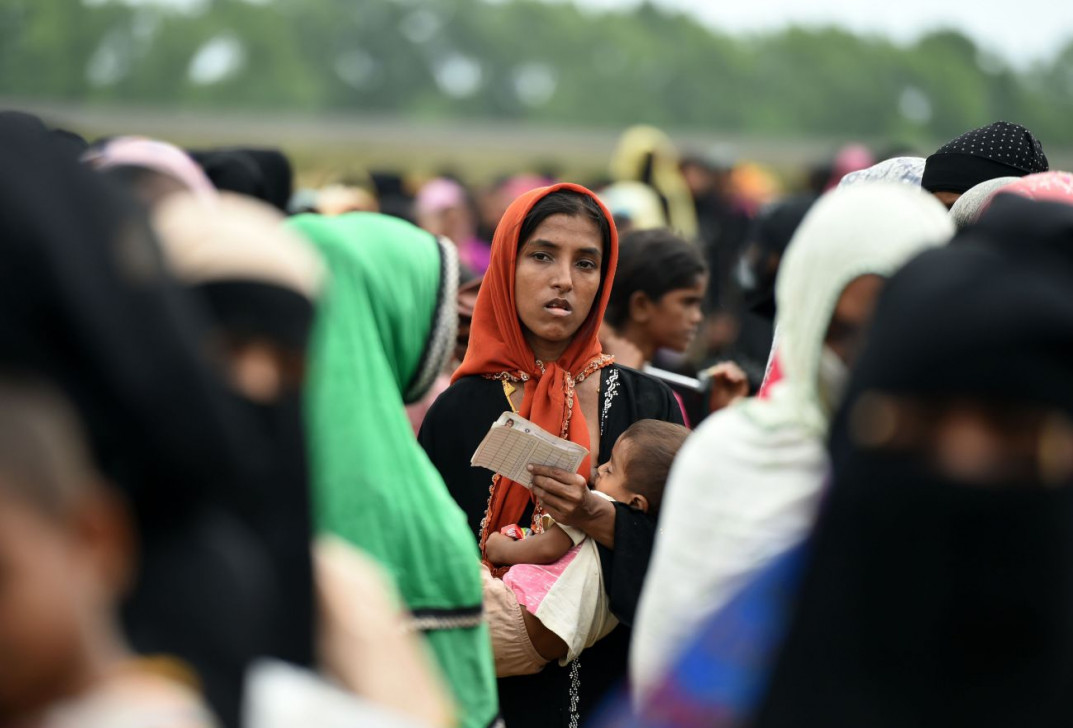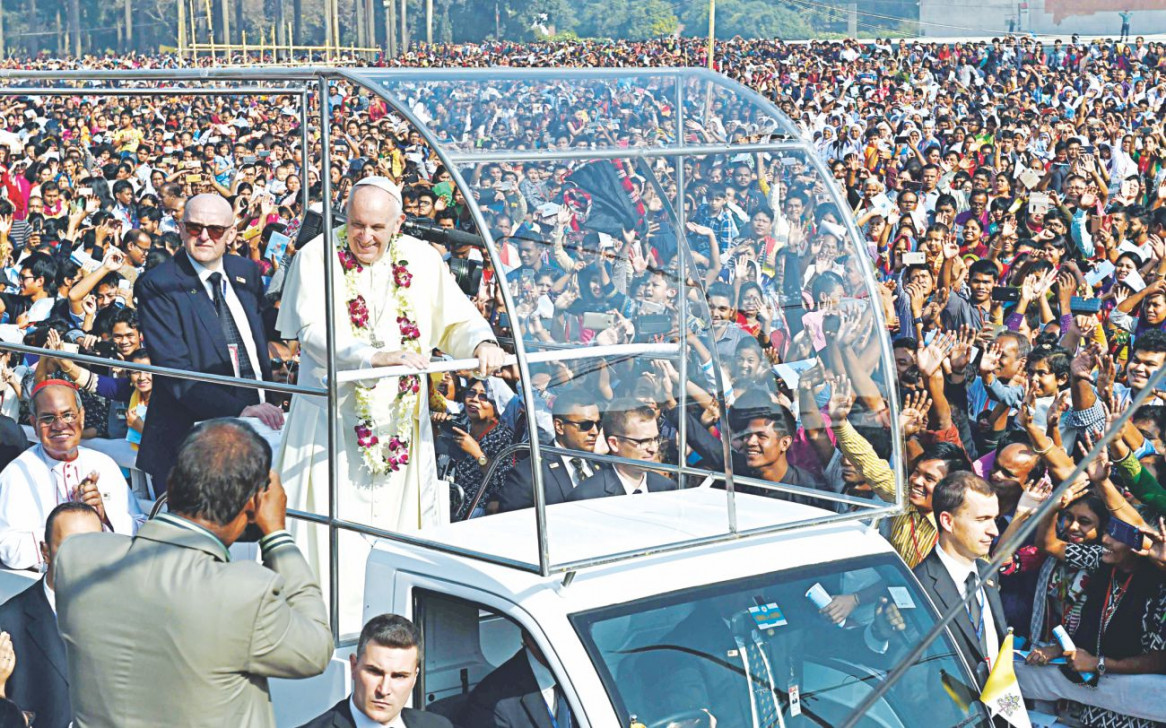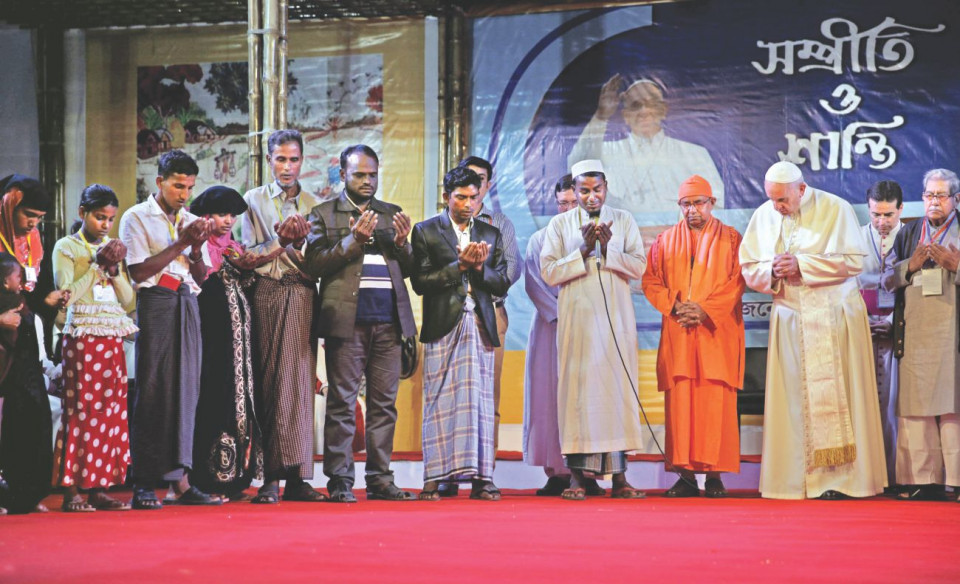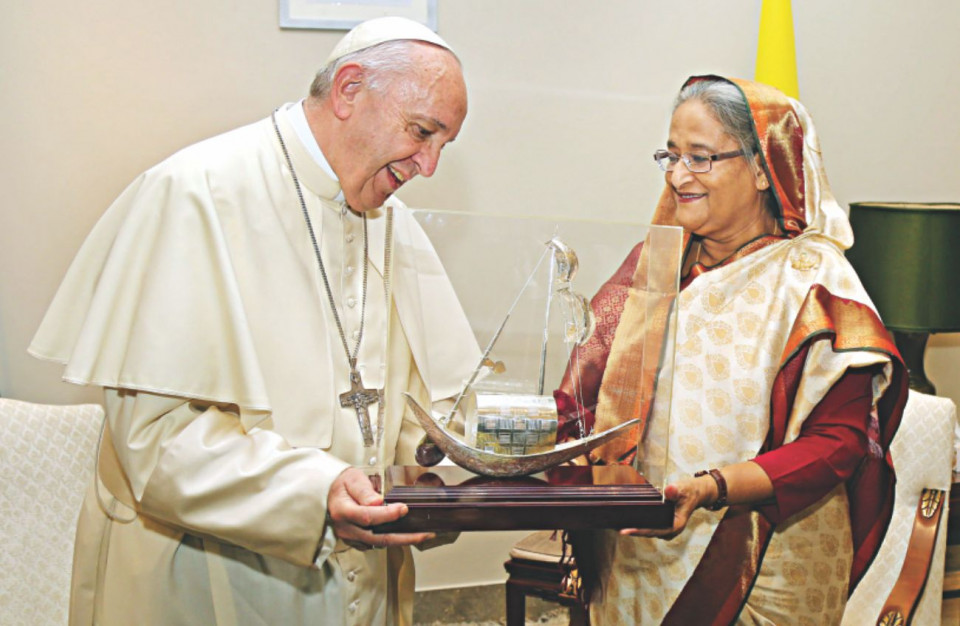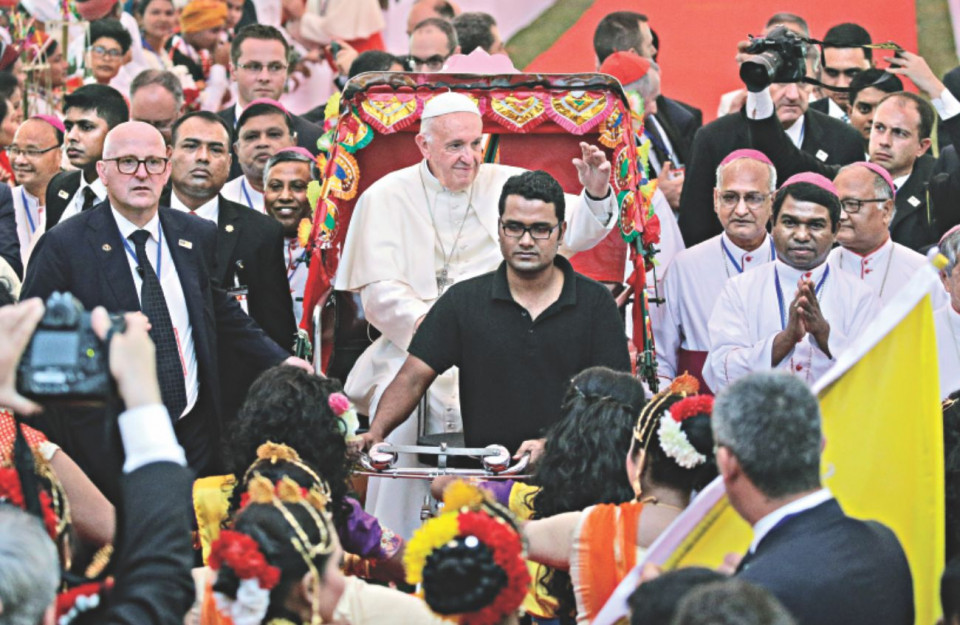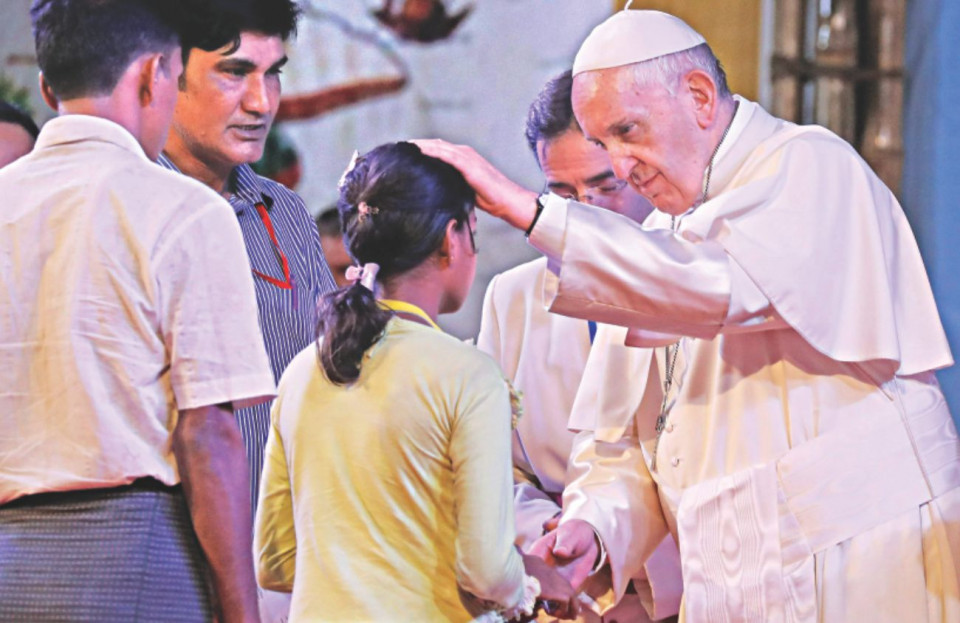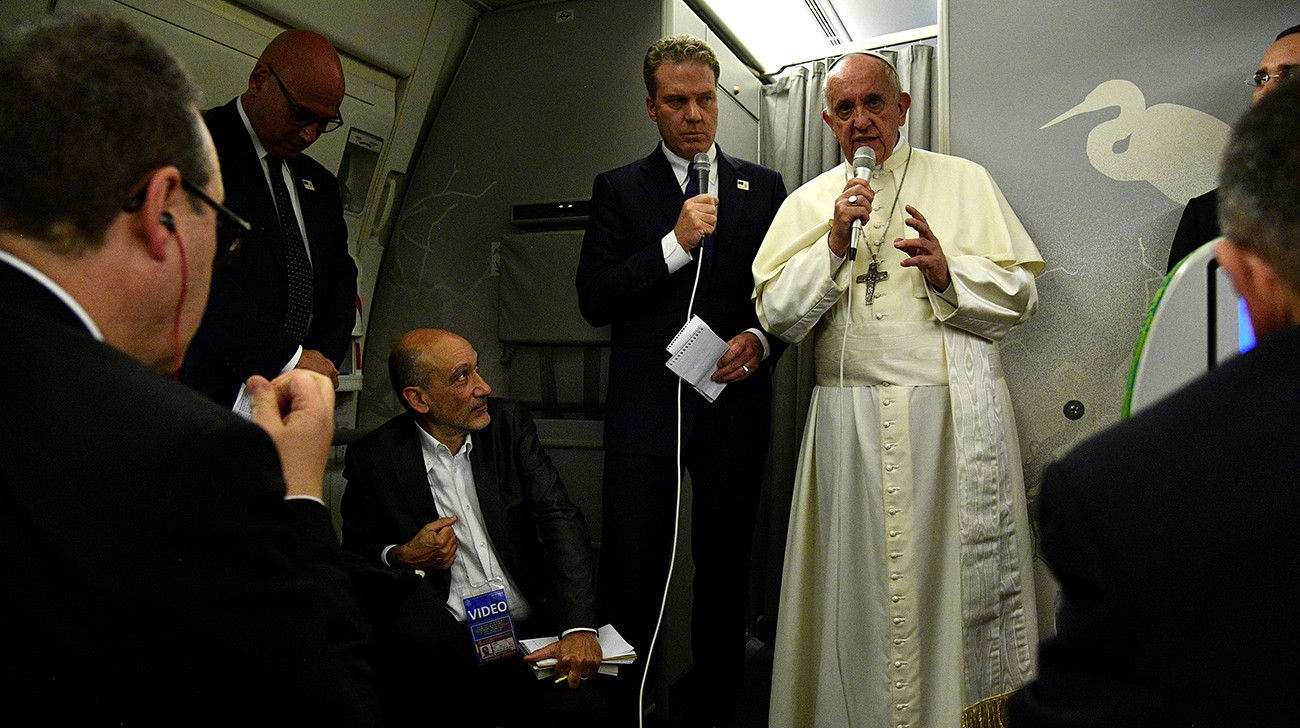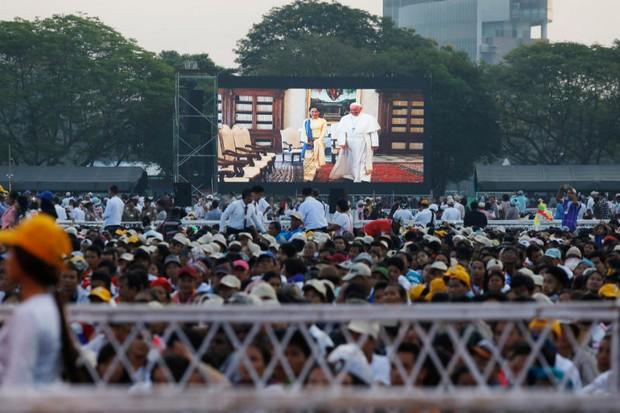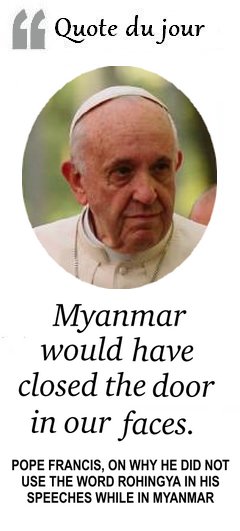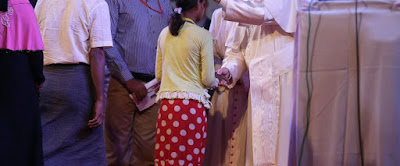Banglar Bir
SENIOR MEMBER

- Joined
- Mar 19, 2006
- Messages
- 7,805
- Reaction score
- -3
- Country
- Location
12:00 AM, December 01, 2017 / LAST MODIFIED: 03:12 AM, December 01, 2017
Stand by Bangladesh
Pope calls for decisive actions from int'l community to end Rohingya crisis; lauds Bangladesh's role in helping refugees
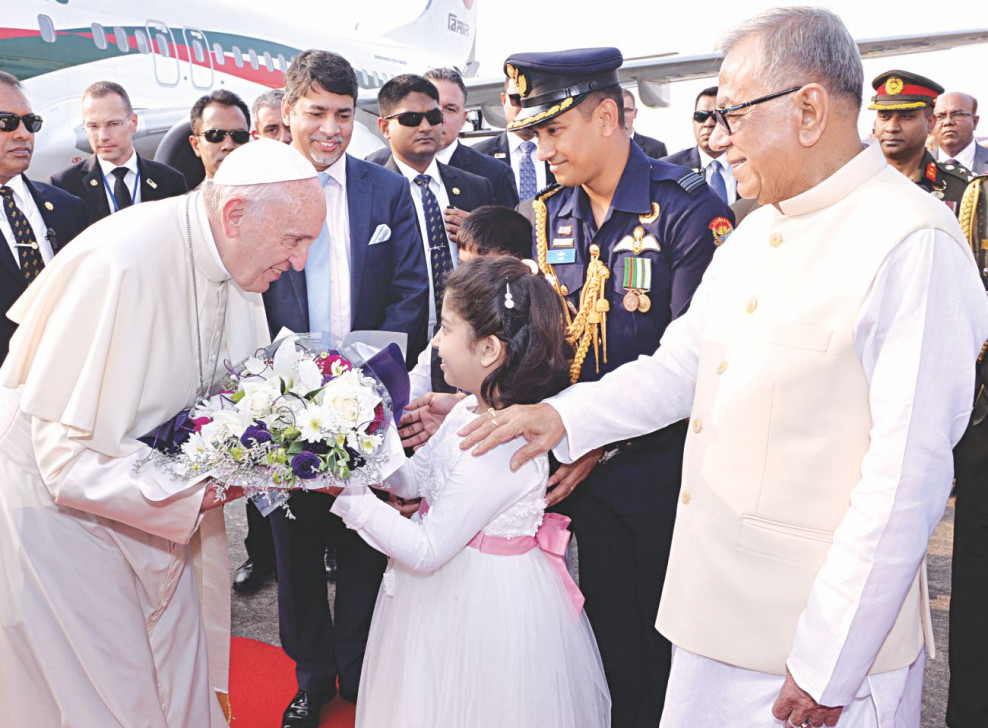
A child presents a flower bouquet to Pope Francis as President Abdul Hamid receives him. The Pope arrived yesterday on a VVIP flight of Biman Bangladesh Airlines which landed at Hazrat Shahjalal International Airport around 2:45pm from Yangon, Myanmar. Photo: PID
Agencies
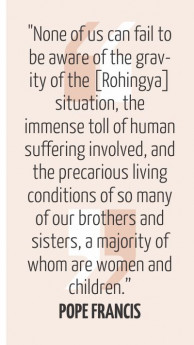
Pope Francis yesterday called for "decisive" international action on the Rohingya refugee crisis as he began a visit to Bangladesh, where more than 620,000 of the Muslim minority have sought sanctuary after fleeing violence in Myanmar.
The pope made the comment in a speech shortly after arriving from Myanmar, where he walked a diplomatic tightrope, staying away from allegations that the army is waging an ethnic cleansing campaign against the Rohingya, despite pressure to publicly confront the incendiary issue, reports AFP.
"None of us can fail to be aware of the gravity of the situation, the immense toll of human suffering involved, and the precarious living conditions of so many of our brothers and sisters, a majority of whom are women and children, crowded in the refugee camps," he said.
"It is imperative that the international community take decisive measures to address this grave crisis, not only by working to resolve the political issues that have led to the mass displacement of people, but also by offering immediate material assistance to Bangladesh in its effort to respond effectively to urgent human needs," the pope told Bangladeshi dignitaries and diplomats.
He praised Bangladesh for taking in the mass exodus across the border into overcrowded makeshift camps since a fresh outbreak of violence in Rakhine state in late August.
But as in Myanmar, he refrained from using the word "Rohingya", instead referring to "refugees from Rakhine state".
Pope Francis had been urged not to use the name in Myanmar to avoid provoking hardline Buddhists and making the country's Catholics a target.
At a private talk with the pontiff later in the evening, President Abdul Hamid sought his help in sending back the displaced Rohingya to their homeland and keeping up the pressure on Myanmar to resolve the protracted crisis, reports UNB.
"During the meeting, the president categorically sought Pope's active role so that different countries and the international community put pressure on the Myanmar government to settle the issue," President's Press Secretary Joynal Abedin later told journalists.
Francis -- the first pope to visit Bangladesh in 31 years -- will spend three days in the mainly-Muslim country, which is grappling with a rise in Islamist extremism that has seen Catholics attacked for their faith, AFP added.
In Dhaka, he will meet some of the Rohingya refugees, whom he has described as his "brothers and sisters", and lead a mass for Bangladesh's tiny Catholic minority.
DILEMMA
Myanmar's government denies the Rohingya are an ethnic group, insisting they are "Bengali" migrants who are not entitled to full citizenship.
The Vatican has rejected suggestions that the pope's reticence to tackle the Rohingya crisis head-on represented a failure of moral leadership.
"He seemed to comprehend the dilemma he faced," David Mathieson, a Yangon-based analyst, told AFP, applauding the Catholic leader's diplomatic dexterity in a country where the army retains great power.
"He is the pope, not a pugilist... he was here to help the country work through this horrific humanitarian crisis and listen to both the civilian and military leadership."
The pontiff was warmly embraced by Myanmar's Catholics, who make up just over one percent of the population.
Today he will lead a mass at Suhrawardy Udyan in the capital that is expected to be attended by around 100,000 people.
Bangladesh's Catholics make up less than 0.5 percent of the population of 160 million and have for centuries lived in relative harmony with their Muslim neighbours.
But there has been a rise in Islamist attacks in recent years targeting religious minorities, foreigners and secular figures.
The papal visit comes days after the disappearance of a Catholic priest in the same village where suspected Islamist extremists hacked a Catholic grocer to death last year.
Walter William Rosario, 40, had been making arrangements for some 300 Catholics to travel to Dhaka for the pope's mass.
Since 2015 at least three Christians, including two converts from Islam, have been hacked to death in attacks blamed on militant groups.
Tens of thousands of Catholics have travelled to the capital hoping to catch a glimpse of Pope Francis, who is to travel to the park for Friday's mass on a traditional cycle rickshaw.
The 80-year-old Argentine pontiff has established a reputation for his down-to-earth manner, vowing to stamp out extravagance among the clergy and bring the Catholic Church closer to the poor.
http://www.thedailystar.net/frontpage/myanmar-rohingya-refugee-crisis-take-decisive-measures-1498810
Stand by Bangladesh
Pope calls for decisive actions from int'l community to end Rohingya crisis; lauds Bangladesh's role in helping refugees

A child presents a flower bouquet to Pope Francis as President Abdul Hamid receives him. The Pope arrived yesterday on a VVIP flight of Biman Bangladesh Airlines which landed at Hazrat Shahjalal International Airport around 2:45pm from Yangon, Myanmar. Photo: PID
Agencies

Pope Francis yesterday called for "decisive" international action on the Rohingya refugee crisis as he began a visit to Bangladesh, where more than 620,000 of the Muslim minority have sought sanctuary after fleeing violence in Myanmar.
The pope made the comment in a speech shortly after arriving from Myanmar, where he walked a diplomatic tightrope, staying away from allegations that the army is waging an ethnic cleansing campaign against the Rohingya, despite pressure to publicly confront the incendiary issue, reports AFP.
"None of us can fail to be aware of the gravity of the situation, the immense toll of human suffering involved, and the precarious living conditions of so many of our brothers and sisters, a majority of whom are women and children, crowded in the refugee camps," he said.
"It is imperative that the international community take decisive measures to address this grave crisis, not only by working to resolve the political issues that have led to the mass displacement of people, but also by offering immediate material assistance to Bangladesh in its effort to respond effectively to urgent human needs," the pope told Bangladeshi dignitaries and diplomats.
He praised Bangladesh for taking in the mass exodus across the border into overcrowded makeshift camps since a fresh outbreak of violence in Rakhine state in late August.
But as in Myanmar, he refrained from using the word "Rohingya", instead referring to "refugees from Rakhine state".
Pope Francis had been urged not to use the name in Myanmar to avoid provoking hardline Buddhists and making the country's Catholics a target.
At a private talk with the pontiff later in the evening, President Abdul Hamid sought his help in sending back the displaced Rohingya to their homeland and keeping up the pressure on Myanmar to resolve the protracted crisis, reports UNB.
"During the meeting, the president categorically sought Pope's active role so that different countries and the international community put pressure on the Myanmar government to settle the issue," President's Press Secretary Joynal Abedin later told journalists.
Francis -- the first pope to visit Bangladesh in 31 years -- will spend three days in the mainly-Muslim country, which is grappling with a rise in Islamist extremism that has seen Catholics attacked for their faith, AFP added.
In Dhaka, he will meet some of the Rohingya refugees, whom he has described as his "brothers and sisters", and lead a mass for Bangladesh's tiny Catholic minority.
DILEMMA
Myanmar's government denies the Rohingya are an ethnic group, insisting they are "Bengali" migrants who are not entitled to full citizenship.
The Vatican has rejected suggestions that the pope's reticence to tackle the Rohingya crisis head-on represented a failure of moral leadership.
"He seemed to comprehend the dilemma he faced," David Mathieson, a Yangon-based analyst, told AFP, applauding the Catholic leader's diplomatic dexterity in a country where the army retains great power.
"He is the pope, not a pugilist... he was here to help the country work through this horrific humanitarian crisis and listen to both the civilian and military leadership."
The pontiff was warmly embraced by Myanmar's Catholics, who make up just over one percent of the population.
Today he will lead a mass at Suhrawardy Udyan in the capital that is expected to be attended by around 100,000 people.
Bangladesh's Catholics make up less than 0.5 percent of the population of 160 million and have for centuries lived in relative harmony with their Muslim neighbours.
But there has been a rise in Islamist attacks in recent years targeting religious minorities, foreigners and secular figures.
The papal visit comes days after the disappearance of a Catholic priest in the same village where suspected Islamist extremists hacked a Catholic grocer to death last year.
Walter William Rosario, 40, had been making arrangements for some 300 Catholics to travel to Dhaka for the pope's mass.
Since 2015 at least three Christians, including two converts from Islam, have been hacked to death in attacks blamed on militant groups.
Tens of thousands of Catholics have travelled to the capital hoping to catch a glimpse of Pope Francis, who is to travel to the park for Friday's mass on a traditional cycle rickshaw.
The 80-year-old Argentine pontiff has established a reputation for his down-to-earth manner, vowing to stamp out extravagance among the clergy and bring the Catholic Church closer to the poor.
http://www.thedailystar.net/frontpage/myanmar-rohingya-refugee-crisis-take-decisive-measures-1498810



